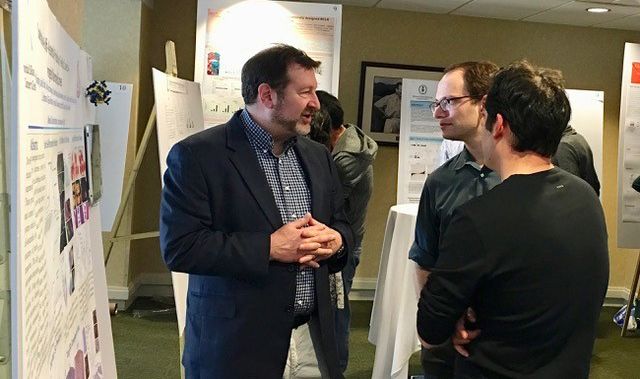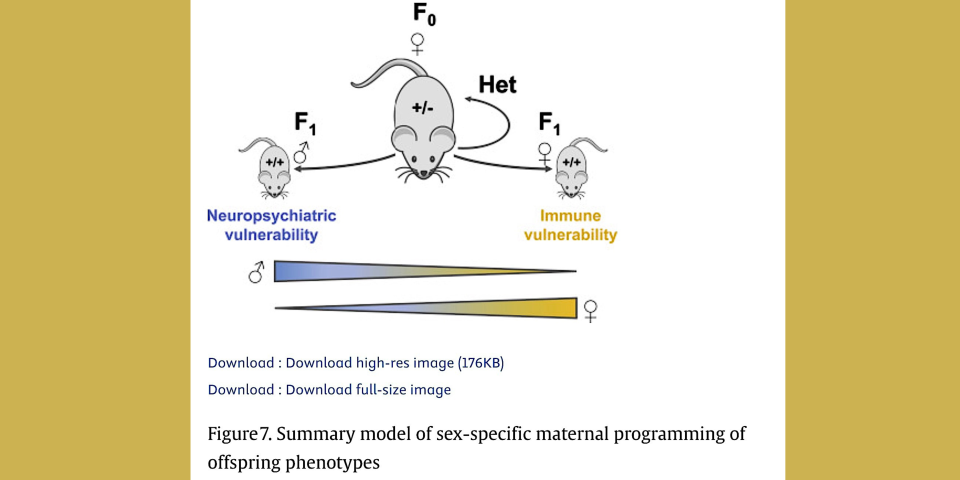The research activities of the Pharmacology Program are directed at understanding how drugs and chemicals modify biological systems.

Researchers are also focused on using and developing new drugs to treat diseases, such as cancer, diabetes, atherosclerosis, epilepsy, anxiety disorders, Alzheimer's disease, and autism.
Dr. Omar Abdel-Wahab focuses on understanding and targeting the somatic mutations driving hematologic malignancies. Given the frequent identification of somatic mutations in genes encoding regulators of transcription in leukemia and lymphoma, the Abdel-Wahab is especially focused on understanding the functional implication of mutations in spliceosomal proteins and epigenetic regulators in hematologic malignancies.
Dr. Heeseon An studies the regulatory mechanisms of protein translation (ribosome) and degradation processes (the ubiquitin proteasome system and autophagy) in health and disease.
Dr. Daniel Bachovchin and his lab design selective inhibitors to study enzymes and pathways in cancer and immune system signaling.
Dr. John Blenis studies biochemical mechanisms that coordinate extracellular cues, intracellular signaling pathways, and metabolic processes to regulate cellular bioenergetics and redox regulation, mRNA metabolism, protein synthesis and gene expression.
Drs. Jochen Buck and Lonny Levin collaborate. They discovered a new signaling pathway via an intracellular, soluble adenylyl cyclase. This signaling pathway plays a role in cell metabolism, insulin action, axonal guidance, and in sperm activation.
Dr. Gabriela Chiosis uses chemical biology approaches to understand the role of molecular chaperones in cancer and neurodegenerative diseases.
Dr. Yael David's lab develops and applies methods in chemical biology toward studying epigenetic regulation and its correlation with disease states.
Dr. Annarita Di Lorenzo focused on studying the role and regulation of sphingolipid metabolism and signaling in cardiovascular and cerebrovascular system, in both physiological and pathological conditions.
Dr. Karuna Ganesh's lab focuses on understanding the molecular mechanisms that underlie the emergence of regenerative plasticity during metastasis.
Dr. Jacob Geri's lab focuses on mapping the sequences of protein interactions which drive disease phenotypes. Work in the Geri Lab will focus on the development and application of optically controlled proximity labeling technologies designed to discover protein interactions with high spatial and temporal specificity. This work is highly multidisciplinary and collaborative, employing techniques from photochemistry, organic / inorganic synthesis, and molecular biology.
Dr. Paraskevi Giannakakou's lab is studying drug-resistance mechanisms specific to microtubule-targeting cancer chemotherapy drugs as well as the biological functions of the microtubule cytoskeleton in intracellular trafficking and signaling in interphase cancer cells.
Dr. Jan Grimm's lab in the Molecular Pharmacology and Chemistry Program focuses on the development of novel and innovative molecular imaging approaches for cancer diagnostics and therapy, predominantly based on activatable agents. These approaches combine and utilize modern biology, nanotechnology, chemistry and physics with modern imaging methods (MRI, optical imaging, PET and Cerenkov) to create novel imaging agents that allow much earlier detection and improved therapy monitoring of cancer, especially with a focus on prostate cancer.
Dr. Steven Gross is defining nitric oxide dependent signal transduction pathways and developing therapies for diseases that are associated with an excess or insufficiency of nitric oxide. The lab is also applying comprehensive mass spectrometry-based "metabolomic" approaches to address biomedical problems involving cell signaling, inborn errors of metabolism, cancer and stem cell biology.
Dr. Lorraine Gudas analyzes how derivatives of vitamin A (retinoids) regulate both cellular differentiation and cellular proliferation during development and in the process of tumor formation.
Dr. Monica Guzman's lab conducts translational research focused on developing novel therapies to target leukemia stem cells in acute myeloid leukemia (AML). Focusing primarily on AML, we work synergistically with clinical investigators in the Leukemia Program of Weill Cornell Medical College to understand how leukemia stem cells are affected in patients undergoing clinical trials.
Dr. Daniel Heller studies bioengineering and nanomaterials for molecular sensors and targeted therapeutics, and clinically-applied nanotechnology.
Dr. Hugh Hemmings studies neuronal cell signaling with a focus on regulation of protein phosphorylation by protein phosphatases, presynaptic mechanisms of general anesthetics including the role of sodium channels, neuroprotection, and novel analgesia therapies.
Dr. Charles Inturrisi is examining the long term outcomes of treatments for chronic cancer and noncancer pain received by Pain Clinic patients. The effectiveness information obtained will allow a determination of which patients benefit from the currently available interventions used for the management of chronic pain and the cost effectiveness of these treatments.
Dr. Samie Jaffrey uses molecular and chemical biology approaches to study signal transduction in neurons and other cells. Another focus of his laboratory is RNA modifications, microscopic techniques for imaging RNA trafficking, and RNA-based sensors for imaging molecules in cells.
Dr. Alex Kentsis' lab is investigating the biology of refractory blood and kidney cancers to improve the treatment of children and adults.
Dr. Michael Kharas' laboratory studies both normal and leukemic stem cells using mouse genetics and pharmacological approaches. The lab is also focused on understanding the role of RNA binding proteins in hematopoietic development.
Dr. Richard Kolesnick discovered the sphingomyelin signal transduction pathway, and is identifying how this pathway initiates stress-induced apoptotic death
Dr. Francis Lee is studying how trafficking of neurotrophins and their receptors regulates central nervous system function.
Dr. Roberto Levi is investigating the role of mast cell-derived renin in cardiac diseases and the cardioprotective effects of a novel histamine receptor subtype (the H3-receptor), which he discovered is activated in myocardial ischemia.
Dr. Jason Lewis The Lewis lab research interests are focused on the development of new PET radiopharmaceuticals for the diagnosis and treatment of cancer.
Dr. Yueming Li's lab studies the reaction mechanism of membrane proteases, determines their function and regulation in cell signaling, and develops novel protease-targeted therapies using an integrated approach of biochemistry, cell biology, chemical biology and proteomics
Dr. James Lo investigates the molecular mechanisms of cardiometabolic diseases such as cardiovascular inflammation, obesity and diabetes with the ultimate goal of developing novel treatments directed against them. The lab uses new molecular tools to gain insight into processes effecting energy homeostasis, adipose biology and pancreatic islet function.
Dr. Minkui Luo's lab aims at developing new chemical genetic tools to define, perturb and manipulate essential functions of the enzymes involving protein posttranslational modification.
Dr. Ingo Mellinghoff's laboratory focuses on the molecular pathogenesis of primary brain tumors. Our current focus is to understand how genetic aberrations in growth factor signaling promote the initiation, progression, and/or maintenance of glioblastoma.
Dr. Ari Melnick's lab uses biochemical, epigenomic, computational, cellular and animal model approaches to define the mechanism of action of oncogenic transcription factors. The group also works on the design of drugs to target oncogenic transcription factors and to develop combinatorial biologically targeted therapy for several types of cancer.
Dr. Taha Merghoub researches the pathogenesis and treatment of melanoma, with major expertise in immunotherapy development.
Dr. Geoffrey Pitt plans on learning how to institute innovative research that improves treatments and therapies for conditions including coronary artery disease, heart failure, cardiac arrhythmias, and hypertension.
Dr. Kristen Pleil studies how neuropeptide and hormone signaling in discrete brain circuits contributes to the development of alcohol/drug addiction and comorbidly-expressed mood disorders such as anxiety and depression.
Dr. Neal Rosen's laboratory is identifying and characterizing signal transduction pathways that cause the dysregulation of growth and inhibition of apoptosis that typify advanced human cancer.
Dr. Charles Rudin's lab focuses on the identification and testing of novel therapeutic strategies for lung cancers using a variety of approaches. We have characterized the genomic and epigenetic landscapes of small cell lung cancer, have employed genome-wide knock-out screening to identify synthetic lethalities, and have made extensive use of patient-derived xenograft models for target validation in vivo
Dr. David Scheinberg is developing immunotherapeutic drugs using monoclonal antibodies conjugated to alpha emitting elements and other toxic compounds that specifically target sites on tumor cells.
Dr. Derek Tan uses diversity-oriented synthesis and rational drug design to identify new chemical biology probes for studying biological systems and as potential therapeutic leads in cancer and infectious diseases.
Dr. Miklos Toth studies how dysfunction in specific genes leads to the development and manifestation of psychiatric symptoms and conditions associated with anxiety.
Dr. Pengbo Zhou Research in the Zhou lab focuses on dissecting the physiological and pathological functions of ubiquitin-dependent proteolysis, and developing chemical inhibitors of Cullin-based ubiquitin ligases as novel therapeutic agents. The Zhou laboratory employs a combination of chemical biology, biochemistry, cell and molecular biology, mouse genetics, and human pathobiology approaches to interrogate the ubiquitin ligases as potential targets for therapeutic intervention.
Dr. Jonathan Zippin lab focuses on studies in the fundamental signaling pathways responsible for cellular growth in the skin. Cellular growth in the skin can occur in response to immune mediators as in psoriasis, as a result of infection with viruses as in verruca vulgaris, and secondary to UV radiation and DNA damage as in skin cancer.


